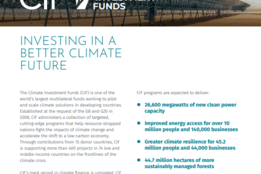WASHINGTON, DC—The Climate Investment Funds’ (CIF) Clean Technology Fund (CTF) has unveiled the CIF Capital Market Mechanism, a groundbreaking effort to issue investment-grade bonds and raise significant new finance for scaling clean energy and sustainable infrastructure in emerging economies. This initiative could mobilize $500 million of additional concessional capital every year for developing countries, leading to an estimated $50 billion in total investment over ten years.
It is the first time a multilateral climate fund is leveraging its balance sheet in the capital markets to unlock urgently needed private investment to help narrow the clean infrastructure gap in developing countries. As leaders gather at COP26 to devise ways of containing global temperature rise and increasing financial support for climate-stricken nations, CTF’s access to capital markets will provide an important contribution to scaling up scarce public capital to achieve climate ambition.
Under the program, which is backed by the United States, United Kingdom, Japan, and others, CIF would monetize existing assets from its Clean Technology Fund to issue bonds in the capital markets. The proceeds will provide a predictable flow of new concessional climate finance for eligible public and private projects that yield long-term, sustainable gains in key emerging markets.
Building on CIF’s twelve years of transformational climate action in 72 developing countries, the funds raised will be disbursed through multilateral development bank partners as equity, debt, mezzanine finance, guarantees, and other forms of finance to help create sustainable markets and scale investment in cutting-edge clean energy and infrastructure projects.
CIF invests in a wide range of climate-smart innovations, including energy storage systems, distributed power generation, coal transition infrastructure, floating solar farms, offshore wind turbines, and electric vehicle fleets.
Innovative financing mechanisms are in greater demand as more investors look for ways to align portfolios with environmental, social and governance (ESG) priorities. In OECD countries alone, institutional investors manage nearly $100 trillion in assets.
Clean energy transitions in emerging economies are central to meeting and exceeding the Paris Agreement and Sustainable Development Goals. Developing countries are home to two-thirds of the world’s population and on track to consume 70% of energy supply and represent 60% of GDP. In 2020, however, developing nations received just one-fifth of clean energy investment, seven times below the threshold needed to achieve a net-zero economy by 2050.
CTF donors are Australia, Canada, France, Germany, Japan, Spain, Sweden, the United Kingdom, and the United States.
UK Chancellor of the Exchequer, Rishi Sunak: “Harnessing the power of our financial system is essential to deliver the investment we need for a low carbon future. That’s why the UK has already invested over £2.5 billion in the Climate Investment Funds, unlocking billions more in private finance for clean energy projects round the world, and is now backing the launch of the innovative new CIF Capital Markets Mechanism, which will turbocharge green investment in emerging economies. I’m also delighted the CIF will issue its green bonds in the City of London, cementing our position as the world’s leading green finance hub.”
U.S. Treasury Secretary, Janet Yellen: “The United States is pleased to join with other countries to support the Climate Investment Funds Capital Markets Mechanism. This innovative initiative will help attract significant private climate finance and provide new funding for the Clean Technology Fund with its valuable work in assisting countries with their transition to a clean energy future.”
Minister of Finance of Japan, Shunichi Suzuki: “We welcome the launch of new CIF Capital Market Mechanism. In order to achieve our common goal of 1.5 degree target, Japan supports developing countries to accelerate the transition away from coal through the financing mechanism with relevant multilateral development banks. Japan recognizes that the importance of transition finance and supports best available options based on each country’s circumstance.”
CEO of the Climate Investment Funds, Mafalda Duarte: “Once again, CIF is setting a higher bar for multilateral climate finance with potentially transformational effect. Consistent with CIF’s innovative mission, we’re trailblazing a capital mobilization model that is scalable, replicable, and game-changing. Emerging economies need significantly more resources to realize their climate ambitions and we are heeding their call. Public capital has an essential role in unleashing and redirecting trillions of dollars in private investment to where it will yield greatest social impact.”
About the Climate Investment Funds
The Climate Investment Funds (CIF) was established in 2008 to mobilize resources and trigger investments for low-carbon, climate-resilient development in select low and middle-income countries. 14 contributor countries have pledged up to $10.5 billion to the Funds. To date, committed CIF capital has generated an additional $61 billion in co-financing for mitigation and adaptation interventions at scale in 72 recipient countries. CIF is one of the largest active climate finance mechanisms in the world. https://www.climateinvestmentfunds.org
MEDIA CONTACT:
Scott Vincent Andrews




